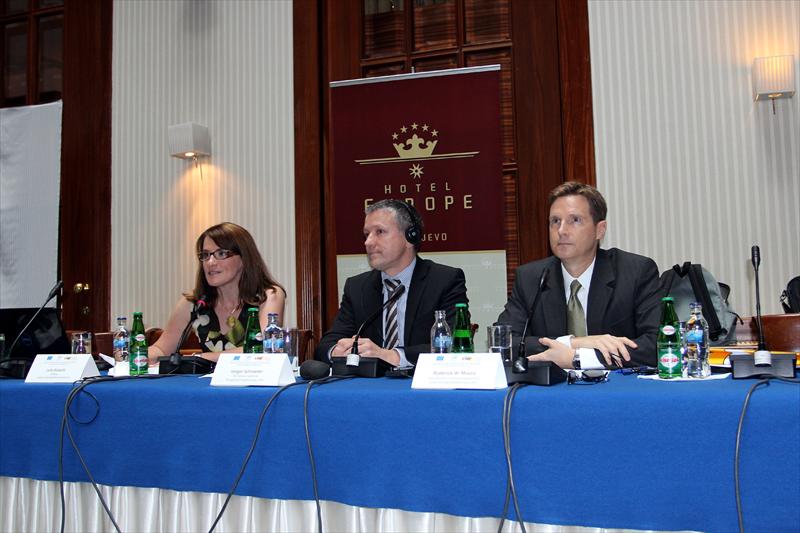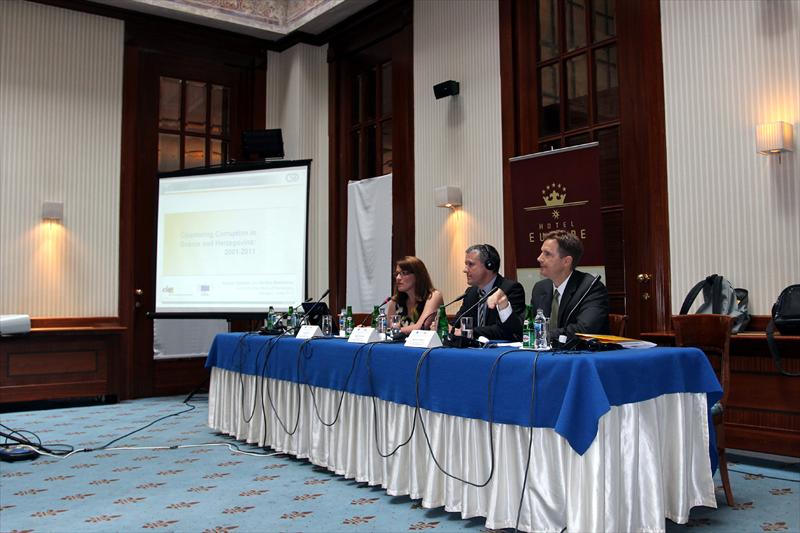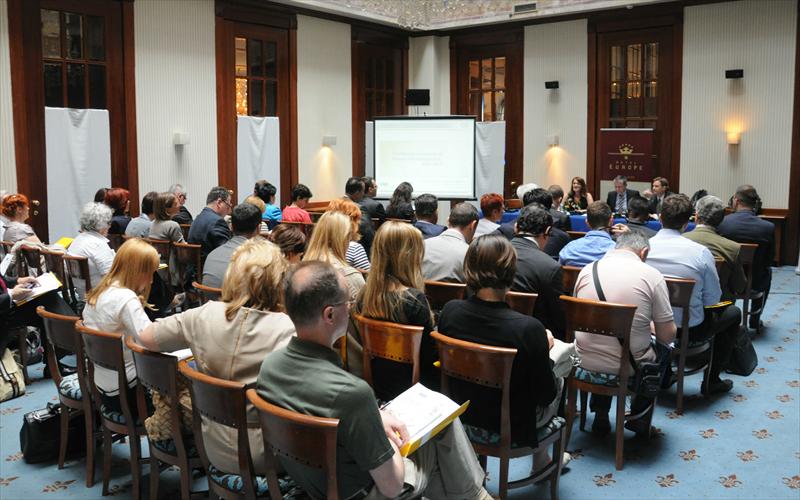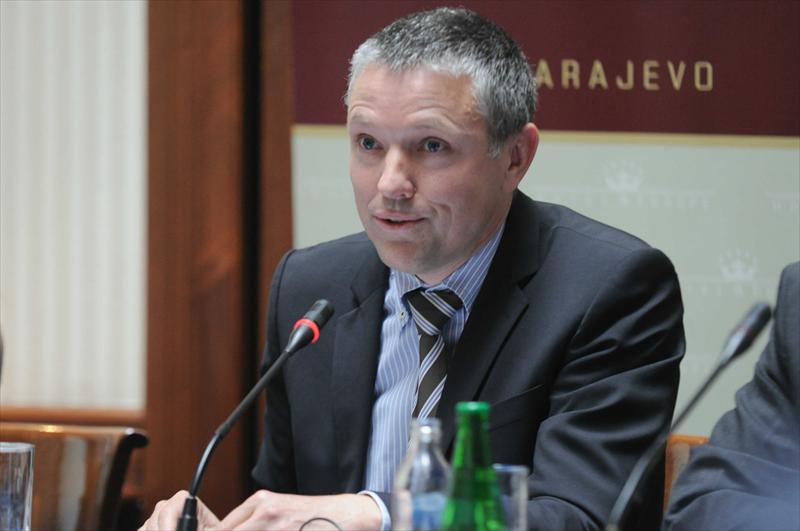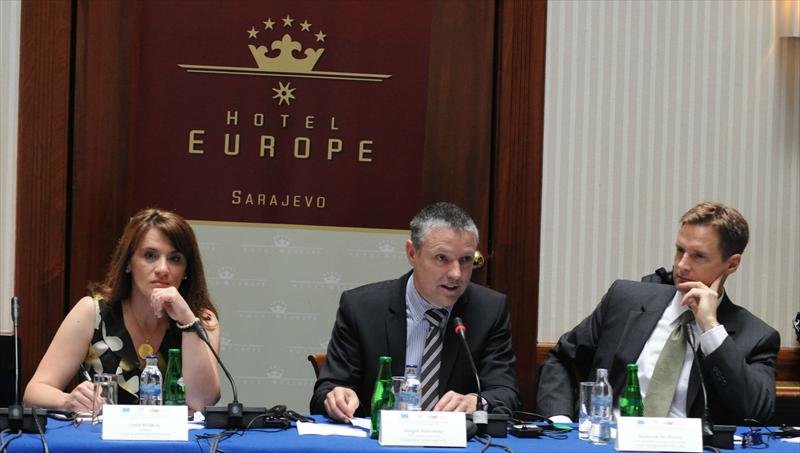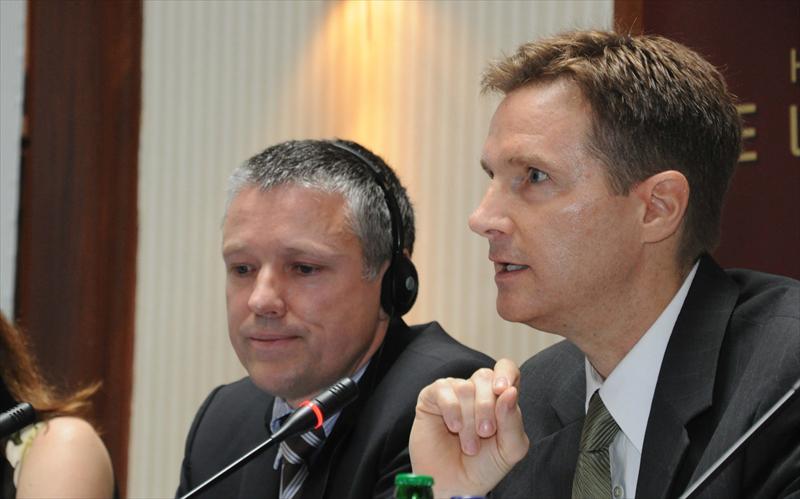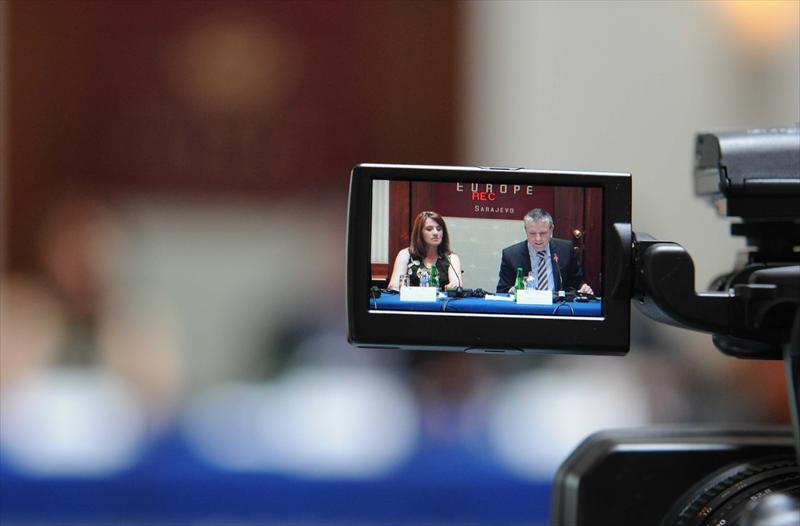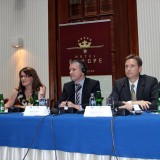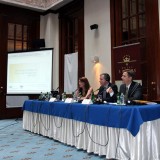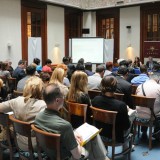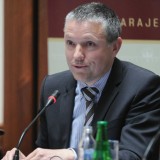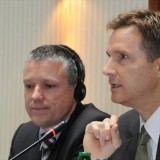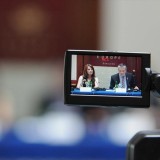Despite some progress in fighting corruption, such as creating specific bodies dedicated to countering corruption and adopting two anti-corruption strategies,
These are the findings from the Corruption Monitoring Report which was jointly presented at the Anticorruption Forum on 12 June 2012, by the Center for Investigative Reporting (CIN) from
The Corruption Monitoring Report is based on CSD’s state of the art Corruption Monitoring System, which was first implemented in BiH in 2001 and has now been employed again in 2011. The report provides an overview of the state and dynamics of corruption in the country, based on citizens’ accounts of:
• actual involvement in and personal experiences with corrupt practices;
• public attitudes towards corruption;
• perceptions of corruption;
• corruption-related expectations.
Holger Schroeder, Head of Operations at the EU Delegation to BiH said: “The EU is very concerned with the level of corruption in
Leila Bičakčić, Director of the Center for Investigative Reporting (CIN) said: „Comparative report on corruption trends in BiH in period 2001 – 2011 summarizes experiences of both CSD and CIN, building on issues and findings covered in CIN stories.”
Main Recommendations of the Report
1) Demonstrating real political will:
• demonstrating clearly defined decision-making process and making it the basis for new anticorruption initiatives;
• meeting public expectations and implementing tangible anti-corruption measures;
• putting a “face” to anti-corruption efforts and not diluting responsibility for their implementation – i.e. political will for radical anti-corruption reforms should be clearly associated with a public figure at the highest level;
• mobilizing the public (and all relevant stakeholders) in support of anticorruption reforms; this will also boost public trust in state institutions and specialized anti-corruption bodies;
• enforcing real and adequate sanctions against corruption crimes, particularly as regards political corruption and organized crime; this would also restore public trust in the government and its anti-corruption agenda;
• being consistent in the fight against corruption (i.e. policies, programs, measures, and the general discourse).
2) Developing a system of adequate diagnostic tools to establish the underlying reasons for corrupt practices and assess areas of high corruption risk: In light of limited resources, measures to fight corruption in BiH ought to be targeted – i.e. focused on professions and institutions most vulnerable or prone to corruption pressures.
3) Assessing already adopted anti-corruption measures and instruments; those deemed effective should be consistently implemented.
4) Emphasizing and endorsing the role of civil society and mass media as an independent mechanism to monitor corruption.
5) Improving the business environment by simplifying institutional structures, avoiding overlap in jurisdictions, establishing a central source of information, optimizing inspections from various entities, reducing the time for navigation through regulatory procedures, notably simplifying the system and administrative procedures, and creating public registries.
6) Demonstrating law enforcement (through adequate investigations and appropriate prosecution of major offenders and key figures), thus boosting public confidence in the government.
7) Enforcing a tight control over the financing of political parties; reaching an adequate level of transparency and information for public monitoring.
8) Establishing knowledge-sharing traditions and mechanisms between public institutions in BiH and independent (international) researchers; more specifically, cooperation on and sharing of organized crime related corruption information to overcome limitations of local anti‐corruption bodies.
9) Proactive rather than reactive approach to detecting corruption – i.e. not relying on detection by chance but consistently scrutinizing; boosting internal institutional detection capacities by establishing internal departments to investigate corruption; developing internal monitoring and analysis mechanisms like anonymous surveys of employees or case studies to identify vulnerable segments within an institution and positions under heightened pressure and, thus, risk for corruption.
10) Increasing corruption‐related training and awareness amongst public employees and the private sector.
Anti-corruption Framework and Infrastructure
BiH’s anti-corruption measures have been influenced by international initiatives, yet lacking local insight. Foreign in nature and left to often inadequate domestic institutions to implement, these measures met with major enforcement challenges. Even at present they seem isolated, rather than part of a comprehensive national policy or strategy. Moreover, decisions on reforms and measures against corruption did not commonly involve all relevant stakeholders, and the communication and co-operation between different state actors are often lacking.
The existing power structures in BiH are complex and remain fragmented. An increase in anticorruption activities is observed after the year 2000, when a number of strategic documents and legal developments took place. In addition, a number of agencies in the country have been tasked with dealing specifically with corruption. Anti-corruption law enforcement in the country is split between police agencies, ministries, and the Prosecutor’s Office. With the basic enforcement infrastructure already in place, the courts have begun to investigate and prosecute alleged cases of corruption. However, instances of cases resulting in convictions are still an exception, rather than the rule. There is a notable shortage of cases against high-level politicians or key organized crime players, and, where there are such cases, they end in a reversal of court decision and a release from custody.
The public procurement reform has been slow and unsatisfactory. Public bidding often lacks transparency and accountability, and the notorious practice of altering or canceling tenders in favour of particular bidders seems commonplace. Similarly, major reforms aimed at increasing tax revenues, while simultaneously tackling corruption, are embedded in the familiar challenges of poor implementation and insufficient enforcement. The Indirect Tax Authority is still facing significant challenges in efficient tax collection, reducing the levels of corruption in the system, carrying out risk analyses and internal auditing, and reducing the size of the hidden economy.
The media is often the first to report suspected cases of corruption and is a key player in the fight against corruption in its capacity to influence social perceptions. While the independence of the media in BiH is provided by the law, political pressure on public broadcasters has not been averted. Concerns over the existence of powerful alliances between political circles, business interests, and the media, as well as increasing influence of organized crime on the media (and thereby undermining investigative journalism) are growing. Yet, as far as police investigations and arrests are concerned, little action has been taken following corruption investigations by the media. The current project shows that adequate investigations occurred in only 32% of the alleged corruption cases.
Trends in Corruption
Unemployment and corruption were the two largest concerns of citizens across all regions in the country. Compared to ten years ago, in 2011 even more people identified corruption as the second major problem in the country (i.e. 50% of the respondents). In line with stabilization of the country’s security, crime notably dropped as a concern.
Every surveyed profession was believed to be more corrupt in 2011 compared to ten years ago. Police officers were seen as most corrupt, which is a notable change from 2001, when the police ranked only 9th out of 19 institutions in terms of perceived level of corruption. Customs officers and their colleagues were also perceived as highly corrupt and ranked second. At the other end of the spectrum, and similar to 2001, teachers and journalists were still perceived as least corrupt. More specifically, respondents felt corruption was least widespread in primary education and the non-governmental sector.
When asked about the key forces driving up corruption in BiH in 2011, over half of the surveyed identified insufficient legislation and personal enrichment of the governing elite as the two major factors nourishing corrupt practices in the country. Yet, insufficient remuneration in the public sector was no longer believed to be a key factor for corrupt practices in the country. Further, the judicial system was believed to be more ineffective than ten years ago.
Compared to 2001, a smaller share of the respondents personally experienced corruption in 2011. Yet, while actual encounters with corrupt practices have marginally decreased, a general increase of pressure from the public administration over citizens to engage in corruption was evident. Those respondents, who had contacts with public sector officials within the past year, were pressured a bit more often to provide extra money, gifts, or favors to public sector employees. This was particularly true for the police and doctors.
The extent to which corrupt practices are tolerated by society, and citizens’ inclination to accept and internalize them, have declined a bit in 2011. This suggests that BiH citizens remain mostly intolerant toward corrupt practices. The majority (7 out of 10) do not deem as acceptable for Members of Parliament, the Government, or local authorities to accept something in return for performing their duties. Yet, susceptibility to corruption (i.e. citizens’ inclination to conform to corrupt activities under pressure) is shown to be higher than the tolerance for corruption, suggesting that the moral condemnation of corruption does not preclude day-to-day corrupt practices. When practical interest is in conflict with one’s value system, citizens tended to compromise their principles in favor of achieving their ends. In 2011, there is a small decrease in susceptibility to corruption. However, more than a fifth of the respondents are inclined to directly pay to solve a problem, provided they had the means to do so.
Respondents’ were not unanimous in their expectations for future positive developments in abating corruption in BiH. Over half of the respondents perceived corruption as a constant, not seeing sufficient capacity (and potential) within their society to eradicate corruption. The remainder shared a more optimistic belief that the level of corruption will decrease or even disappear as a phenomenon. Overall, pessimism regarding the abatement of corruption tended to prevail, and data for 2011 indicate a further disillusionment of citizens with the fight against corruption in the country.
Overall, this study points to an increase in the population’s perceptions of ever spreading corruption between 2001 and 2011, despite a lack of notable increase in first-hand experiences with corrupt practices. The concern that corruption is deeply entrenched into public institutions (i.e. among their staff) was universal across all regions. The majority believed that most officers in public institutions were involved in corrupt activities. At the same time corruption acceptance, susceptibility to corruption and its practical efficiency in solving one’s everyday problems have all decreased between 2001 and 2011, in effect reducing the actual involvement of citizens in corruption. It seems that while corruption practices have receded, the pressure has increased and citizens have grown more disillusioned that reducing corruption to acceptable levels is in sight.
These findings may reflect a raised public awareness of the problem during the period owing to the media and a few isolated measures adopted by the government. Then again, the increase in public perceptions of wider spread of corruption may also reflect a popular discouragement over the lack of progress in fighting and eradicating corruption over the last decade. The latter views are not exclusive to the country’s population, as some international organizations operating in the country have also repeatedly noted to see no real progress, nor a firm political commitment, in the fight against corru

